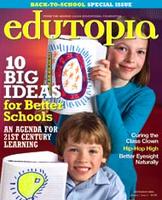
This is a wonderful magazine that is available through an RSS feed. After reading the articles from the current issue in my news aggregator, I think I'm going to subscribe to the print edition. Few articles have articulated the vision I have for the classroom as well as this one entitled "Big Ideas for Better Schools." They identify ten credos that are categorized under students, teachers, schools and community. The magazine plans on publishing a series of essays that will expand on each credo in upcoming issues.
Below are some of the credos I feel are most important.
STUDENTS
Engage: Project-Based Learning Students go beyond the textbook to study complex topics based on real-world issues, such as the water quality in their communities or the history of their town, analyzing information from multiple sources, including the Internet and interviews with experts. Project-based classwork is more demanding than traditional book-based instruction, where students may just memorize facts from a single source. Instead, students utilize original documents and data, mastering principles covered in traditional courses but learning them in more meaningful ways. Projects can last weeks; multiple projects can cover entire courses. Student work is presented to audiences beyond the teacher, including parents and community groups.
Connect: Integrated Studies Studies should enable students to reach across traditional disciplines and explore their relationships, like James Burke described in his book Connections. History, literature, and art can be interwoven and studied together. Integrated studies enable subjects to be investigated using many forms of knowledge and expression, as literacy skills are expanded beyond the traditional focus on words and numbers to include graphics, color, music, and motion.
Expand: Comprehensive Assessment Assessment should be expanded beyond simple test scores to instead provide a detailed, continuous profile of student strengths and weaknesses. Teachers, parents, and individual students can closely monitor academic progress and use the assessment to focus on areas that need improvement. Tests should be an opportunity for students to learn from their mistakes, retake the test, and improve their scores.
TEACHERS
Coach: Intellectual and Emotional Guide The most important role for teachers is to coach and guide students through the learning process, giving special attention to nurturing a student's interests and self-confidence. As technology provides more curricula, teachers can spend less time lecturing entire classes and more time mentoring students as individuals and tutoring them in areas in which they need help or seek additional challenges.
SCHOOLS
Adopt: Technology The intelligent use of technology can transform and improve almost every aspect of school, modernizing the nature of curriculum, student assignments, parental connections, and administration. Online curricula now include lesson plans, simulations, and demonstrations for classroom use and review. With online connections, students can share their work and communicate more productively and creatively.
COMMUNITIES
Involve: Parents When schoolwork involves parents, students learn more. Parents and other caregivers are a child's first teachers and can instill values that encourage school learning. Schools should build strong alliances with parents and welcome their active participation in the classroom. Educators should inform parents of the school's educational goals, the importance of high expectations for each child, and ways of assisting with homework and classroom lessons.
Include: Community Partners Partnerships with a wide range of community organizations, including business, higher education, museums, and government agencies, provide critically needed materials, technology, and experiences for students and teachers. These groups expose students and teachers to the world of work through school-tocareer programs and internships. Schools should enlist professionals to act as instructors and mentors for students.
No comments:
Post a Comment